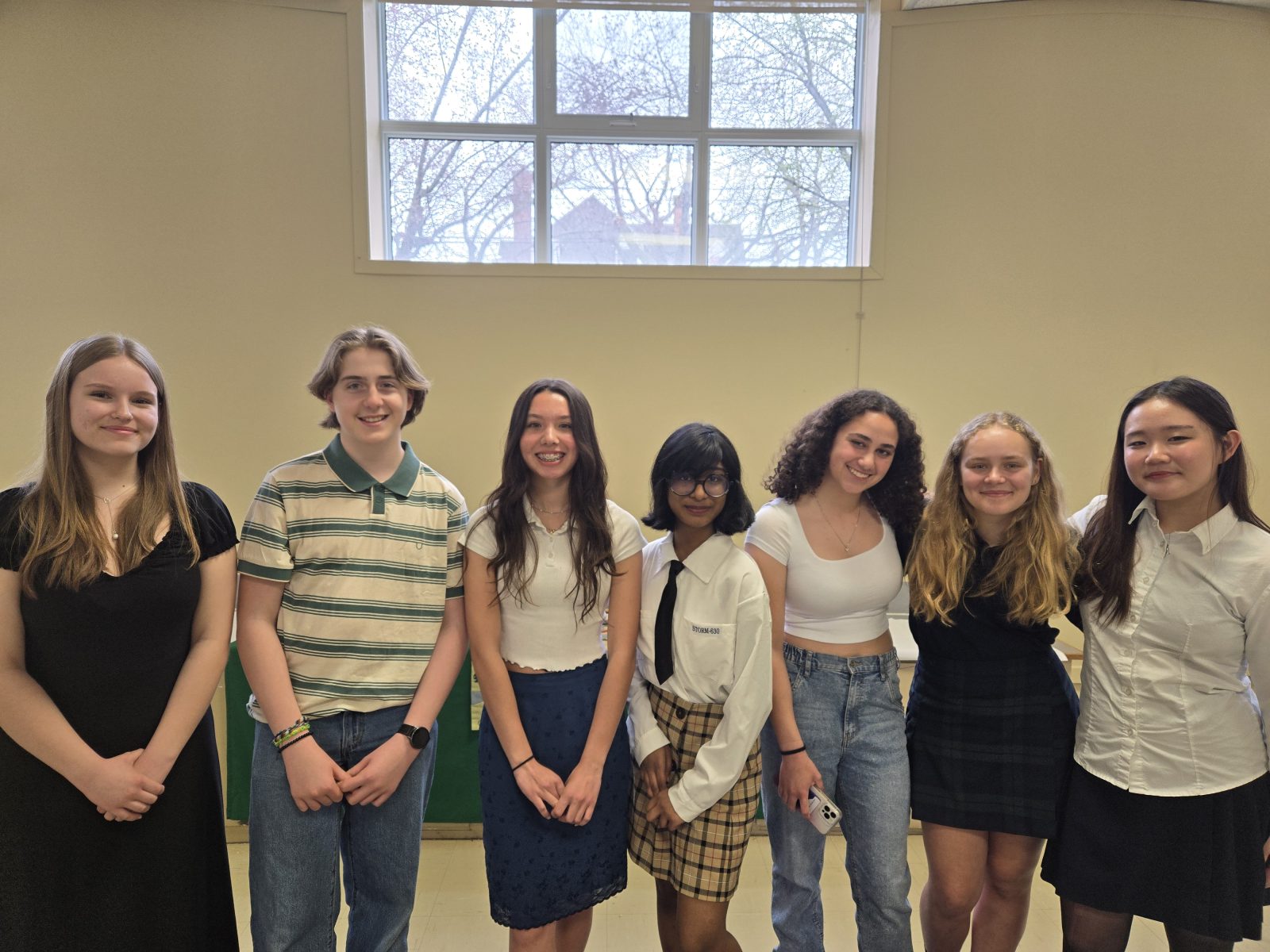Stanstead College cleans up at CFUW public-speaking contest
By William Crooks
Local Journalism Initiative
Two students from Stanstead College, Alison Om (Senior) and Jade Thibault (Junior), won in their respective categories at the Canadian Federation of University Women- Sherbrooke and District’s (CFUW) annual public-speaking competition held May 1 in the basement of Lennoxville’s Hope Community Church. The winners received $100 each for their school’s library.
Organizer Jane Loiselle presided over the event with nearly 40 in attendance, including local politicians Claude Charron and Jennifer Garfat. The competition was put on hiatus for four years due to the pandemic.
Some seven students from local high schools participated. Loiselle said some schools were not represented due to exam rescheduling caused by the teacher’s strikes at the end of last year. Previous events boasted upwards of 20 young competitors.
Judging the event were Tim Belford, former CBC “Quebec AM” radio show host and columnist for The Record, Jan Draper, senior project coordinator of Write Here, Write Now, and Bev Taber Smith, who is involved with the Townships Sun and the CFUW.
The following are the names of the student participants, the title of their speech, what school and category they represented, and a short summary of what they said:
Kayla Pietraszkiewicz – “Animal testing should be banned worldwide” (Galt Junior)
In an evocative speech, Pietraszkiewicz passionately argued against animal testing, depicting its brutal reality where animals endure extreme suffering for products meant for human use.
She highlighted the high failure rate of such tests and the subsequent unreliability in medicine, questioning the justification of such cruelty.
She pointed out the environmental hazards from disposing of the tested animals and urged a global ban on animal testing, noting the unnecessary loss of animal lives and the ineffectiveness of the results in contributing valuable medical information.
She advocated for consumer awareness and choosing products that do not perpetuate animal suffering.
Alexandre Papillon – “What’s on our plate?” (BCS Junior)
Papillon’s presentation addressed the transparency and safety concerns surrounding Canadian food safety standards.
He pointed out that commonly enjoyed products like gummy bears are made with gelatin derived from cattle bones and pork skin, which many consumers may not be aware of. Furthermore, he highlighted that certain toxins, including melamine known to harm kidneys, are legally permitted in food products like dairy.
He also mentioned troubling findings of physical contaminants such as glass and paintbrush parts in food, demonstrating potential flaws in current regulatory practices.
He suggested that adopting organic foods could mitigate exposure to artificial chemicals and reduce environmental pollution, advocating for improved food safety regulations and clearer labeling to better inform consumers.
Jade Thibault – “It’s not enough to be against something. You have to be for something better” (Stanstead Junior)
Thibault addressed fellow students, faculty, judges, and guests, invoking a powerful quote from Tony Stark in “Avengers: Endgame”: “It’s not enough to be against something. You have to be for something better.”
This choice was motivated by her belief in the quote’s truthfulness. She interpreted it as a call to support causes actively seeking change, rather than merely opposing issues, which she deemed performative.
The example of Martin Luther King Jr. was highlighted, noting his peaceful, proactive stance against inequality, exemplified by actions like the Montgomery Bus Boycott.
She emphasized the importance of nonviolent solutions, urging the audience to engage in activities like protests, signing petitions, and encouraging participation in social causes.
She challenged the audience to reflect on their role in combating inequality, underscoring the ongoing struggle but affirming the impact of individual contributions toward societal change.
Janani Spurthui Sikhakolli – “Measles” (Galt Junior)
Sikhakolli said measles, once believed to be under control, remains a highly contagious disease, with 90 per cent infection rates among the unprotected.
She said it manifests with flu-like symptoms and distinctive irritating rashes. Historically noted since the 9th century, measles caused up to 2.6 million deaths annually before widespread vaccination.
Despite vaccinations reducing occurrences, the COVID-19 pandemic diverted attention and resources, causing a resurgence.
Annually, measles still affects nine million people globally, leading to around 136,000 deaths. Vaccination remains the most effective prevention, with a 97 per cent efficacy rate with two doses.
She said this alarming persistence underscores the need for continuous public health vigilance and education about measles.
Aurélie Monast-Haddad – “Our Accent, Our Legacy” (BCS Senior)
Monast-Haddad announced her topic on accent discrimination and its deep-seated roots in societal norms.
She described accent discrimination as a systemic linguistic oppression impacting millions globally. She admitted her own guilt in perpetuating these biases, despite being a victim of mockery for her Quebecois accent, highlighting a lack of representation in the media and the scorn it incites even among Quebecers.
She explained the cognitive strain foreign accents produce, which unfortunately leads to negative perceptions.
She advocated for awareness and inclusivity, emphasizing that accents are more than just pronunciations; they are the legacies and histories of individuals, deserving respect and honour rather than mockery.
Arabella MacAulay-Fishman – “Why you should vote” (BCS Senior)
MacAulay-Fishman, a 15-year-old Grade 10 student, passionately addressed the importance of voting and the need for better political education in schools.
She noted that in Canada’s last election, only 78 per cent of eligible voters participated, leaving over 12 million people who did not vote. She emphasized that even those uninterested in politics are affected by election outcomes, which influence crucial policies on education, healthcare, and the environment.
She argued that non-voters inadvertently increase the influence of those who do vote, leading to a government that may not reflect the broader population’s interests.
She highlighted the historical struggles for enfranchisement as a marker of societal power and pointed out that barriers like a lack of political education still hinder voter participation.
Citing a study, she revealed that many Canadians received little to no civic education, which is vital for informed participation and advocacy. She called for a standardized civic curriculum to empower future generations and encourage active engagement in societal change.
Alison Om – “You never know. You hope for the best and make do with what you get” (Stanstead Senior)
Om referenced a quote from Nick Fury about making the best of what one has. She highlighted common clichés about perseverance and achievement, acknowledging the fatigue many feel towards such sayings.
She then addressed common excuses people make for not pursuing their dreams, like being too tired or feeling inadequate. She pointed out the reality that some dreams are indeed unachievable, but emphasized hard work, dedication, and goal-setting as keys to overcoming doubts and limitations.
She cited two athletes who overcame significant physical disabilities, to inspire the audience to challenge their own perceptions of limitations and pursue their “impossible” despite the odds.
She concluded by questioning whether constant negativity is truly realism or just a disguise for pessimism, urging the audience to consider how they approach their own challenges.
After the speeches there was a brief time of socializing and refreshment while the judges made their decisions. Loiselle handed out participation certificates to all competitors and announced Thibault and Om as the winners.
Loiselle congratulated the winners and said she hoped more students would participate next year.





